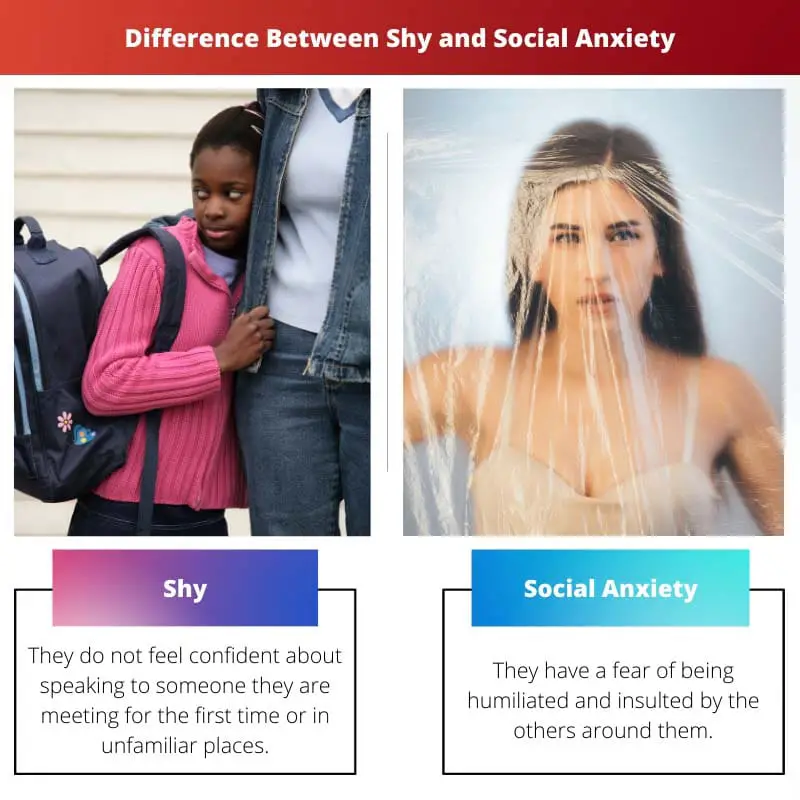Shy people are not seen in the forward line of society, but they exist.
They have their own characteristics and way of living, but on the other hand, there are some people who have a trait similar to that of a shy person, but they are different. These people are mentally affected.
They are affected by a mental disorder called social anxiety. Here are a few differences between shyness and social anxiety to spot them and help them to overcome their problems.
Key Takeaways
- Shyness is a personality trait characterized by feeling uncomfortable in social situations, while social anxiety is a mental health disorder characterized by excessive fear and self-consciousness.
- Shyness is a common and relatively mild condition, while social anxiety is a more severe and disabling condition.
- Shyness is situational and does not interfere with daily functioning, while social anxiety can be pervasive and significantly impair daily functioning.
Shy vs Social Anxiety
Shyness is a personality trait characterized by feelings of discomfort or awkwardness in social situations, in unfamiliar situations or in situations where one is the centre of attention. Social anxiety is a mental health condition characterized by intense fear or anxiety in social situations.

But it can be seen the same person in the forward line of the crowd at some other place with different people. This happens due to a trait called shyness.
They are shy to cope up with new people or a new environment but gradually get comfortable.
Social anxiety is a mental disorder. This disorder develops in a person due to prolonged insult or avoidance by someone or at some place.
This created the trauma of being ignored and insulted when they were someplace. This may also develop due to some different physical characteristics in them.
Comparison Table
| Parameters of Comparison | Shy | Social Anxiety |
|---|---|---|
| Reason | This is a personal trait | This develops due to surroundings and social causes. |
| Treatments | It is temporary as gradually gets cured when the person becomes familiar with the surroundings. | It needs medical care and supervision |
| Effect on people | These do not affect the person do much. They are not depressed regarding their shyness. | These come with physical dissimilarities and the thought of being ignored and avoided by the society |
| Nature | They do not feel confident about speaking to someone they are meeting for the first time or in unfamiliar places. | They have a fear of being humiliated and insulted by the others around them. |
| Thoughts | They may feel comfortable around their known people and environment. | They want to talk and gain familiarity with people but anxiety and fear come in the way between. |
What is Shy?
There are some people who are always sitting in one place and reading books and are not comfortable in the environment. These types of people are most missed when we see a crowd.
These people are not much confident to come forward and show their existence.
But it can be seen the same person in the forward line of the crowd at some other place with different people. This happens due to a trait called shyness.
They are shy to cope up with new people or a new environment but gradually get comfortable. This formation of a comfort zone needs time, but gradually it becomes ok for the people.
This is a natural trait ad not to be cautious of.
These people do not have any effect on their minds due to their shy traits. As they knew that it would take time, but they could manage.
These also do not make them depressed as they might not be comfortable in one place or with someone, but they have another place or group of people with whom they are comfortable.
To overcome shyness, they should regularly practice talking with new people and make up a new habit of being socialized.

What is Social Anxiety?
Social anxiety is a mental disorder. This disorder develops in a person due to prolonged insult or avoidance by someone or at some place.
This created the trauma of being ignored and insulted when they were at some place. This may also develop due to some different physical characteristics in them.
It is mostly found that people whose hands are too sweaty or have a bad sweat smell are ignored and insulted. This leads to trauma, affecting their brain and leading to social anxiety.
They do not want to move out of their house and meet anyone. This is a serious mental illness and needs to be taken care of for a fast recovery.
These people develop a mental illness in the long term, which can even lead to madness. So they are very sensitive and should be handled with care.
Cognitive science deals with these types of mental disorders. They find the cause and give the patient the psychological therapy they need. These people are not anti-social. They want to talk to people and enjoy themselves around them, but when they think of this, the fear and anxiety of being insulted and avoided come in between. They again get drowned in the dark area of depression and fear.
Main Differences Between Shy and Social Anxiety
- Shyness is a personal trait in comparison to the social anxiety that develops due to surroundings and social causes.
- Shyness does not affect the person too much. They are not depressed regarding their shyness, but on the other hand, social anxiety comes with physical dissimilarities and the thought of being ignored and avoided by society.
- Shy people do not feel confident about speaking to someone they are meeting for the first time or in unfamiliar places, but in contrast, people affected with social anxiety have a fear of being humiliated and insulted by others around them.
- Shy people may feel comfortable around their known people and environment, but in comparison, social anxiety affects people who want to talk and gain familiarity with people, but anxiety and fear come in the way.
- Shyness is temporary as it gradually gets cured when the person becomes familiar with the surroundings, but on the other hand, people affected with social anxiety need medical care and supervision.

- https://conference.nber.org/confer/2005/lss05/niederle.pdf
- https://pubsonline.informs.org/doi/abs/10.1287/mnsc.1120.1542

I believe shyness and social anxiety are serious issues to address. People affected by either of these conditions must be understood and supported, whether they’re struggling with a personal trait or a mental health disorder.
This article effectively distinguishes between shyness and social anxiety, shedding light on the impact of both conditions. Understanding these differences is essential to foster empathy and support individuals affected.
This piece provides a clear distinction between shyness and social anxiety, helping readers understand the fundamental differences between the two. It’s important to recognize when individuals need professional care and support, especially in the case of social anxiety.
The narrative about shyness and social anxiety in this article is enlightening. Addressing stigma and misunderstanding around social anxiety is crucial to ensure individuals with mental health disorders receive the help they need.
From this article, I can confirm that people dealing with social anxiety need help from professionals to treat their condition and overcome their mental illness. It is not just about being shy, they go through a lot.
The in-depth comparison between shyness and social anxiety provides valuable insights. It’s important to recognize the impact of mental health disorders and ensure those affected receive necessary care.